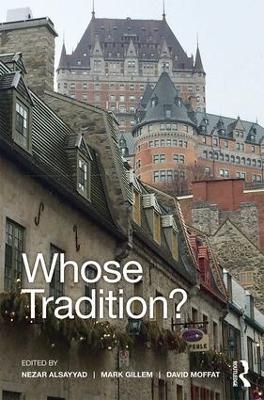
Whose Tradition?
Routledge (Verlag)
978-1-138-19207-2 (ISBN)
Following Nezar AlSayyad’s Prologue, contributors addressing the first theme take examples from Indonesia, Myanmar and Brazil to explore how traditions rooted in a particular place can be claimed by various groups whose purposes may be at odds with one another. With examples from Hong Kong, a Santal village in eastern India and the city of Kuala Lumpur, contributors investigate the concept of indigeneity, the second theme, and its changing meaning in an increasingly globalized milieu from colonial to post-colonial times. Contributors to the third theme examine the lingering effects of colonial rule in altering present-day narratives of architectural identity, taking examples from Guam, Brazil, and Portugal and its former colony, Mozambique. Addressing the final theme, contributors take examples from Africa and the United States to demonstrate how traditions construct identities, and in turn how identities inform the interpretation and manipulation of tradition within contexts of socio-cultural transformation in which such identities are in flux and even threatened. The book ends with two reflective pieces: the first drawing a comparison between a sense of ‘home’ and a sense of tradition; the second emphasizing how the very concept of a tradition is an attempt to pin down something that is inherently in flux.
Nezar AlSayyad, President of the International Association for the Study of Traditional Environments, is Professor of Architecture, Planning, Urban Design and Urban History, at the University of California, Berkeley, USA. Mark Gillem, Professor at the University of Oregon, USA teaches architecture and urban design through a joint appointment in the Departments of Architecture and Landscape Architecture. David Moffat is an architect and planner in Berkeley, California, USA. He is currently Managing Editor of Traditional Dwellings and Settlements Review.
Preface vii
The Editors and Contributors ix
Prologue
Whose Tradition?
Nezar AlSayyad
Part I: Place: Whose Nation, Whose City?
1 Tradition and Its Aftermath: Jakarta’s Urban Politics
Abidin Kusno
2 Tradition as an Imposed and Elite Inheritance: Yangon’s Modern
Past
Jayde Lin Roberts
3 Mega-Events, Socio-Spatial Fragmentation, and Extraterritoriality
in the City of Exception: The Case of Pre-Olympic Rio de
Janeiro
Anne-Marie Broudehoux
Part II: People: Whose Indigeneity?
4 Revamping Tradition: Contested Politics of ‘the Indigenous’ in
Postcolonial Hong Kong
Shu-Mei Huang
5 Their Voice or Mine? Debating People’s Agency in the
Construction of Adivasi Architectural Histories
Gauri Bharat
6 Malaysianization, Malayization, Islamization: The Politics of
Tradition in Greater Kuala Lumpur
Tim Bunnell
vi Whose Tradition?
Part III: Colonialism: Whose Architecture?
7 How the Past and the Future Have Influenced the Design of
Guam’s Government House
Marvin Brown
8 The Missing ‘Brazilianness’ of Nineteenth-Century Brazilian
Art and Architecture
Pedro Paulo Palazzo and Ana Amélia de Paula Moura
9 Empire in the City: Politicizing Urban Memorials of
Colonialism in Portugal and Mozambique
Tiago Castela
Part IV: Time: Whose Identity?
10 Whose Neighbourhood? Identity Politics, Community
Organizing, and Historic Preservation in St. Louis
Susanne Cowan
11 Cosmopolitan Architects and Discourses of Tradition and
Modernity in Post-Independence Africa
Jennifer Gaugler
12 New Traditions of Placemaking in West-Central Africa
Mark Gillem and Lyndsey Deaton
Reflections
13 The Agency of Belonging: Identifying and Inhabiting Tradition
Mike Robinson
14 Process and Polemic
Dell Upton
| Erscheinungsdatum | 05.07.2017 |
|---|---|
| Verlagsort | London |
| Sprache | englisch |
| Maße | 156 x 234 mm |
| Gewicht | 771 g |
| Themenwelt | Naturwissenschaften ► Biologie ► Ökologie / Naturschutz |
| Naturwissenschaften ► Geowissenschaften ► Geografie / Kartografie | |
| Sozialwissenschaften ► Soziologie | |
| Technik ► Architektur | |
| ISBN-10 | 1-138-19207-4 / 1138192074 |
| ISBN-13 | 978-1-138-19207-2 / 9781138192072 |
| Zustand | Neuware |
| Haben Sie eine Frage zum Produkt? |
aus dem Bereich


